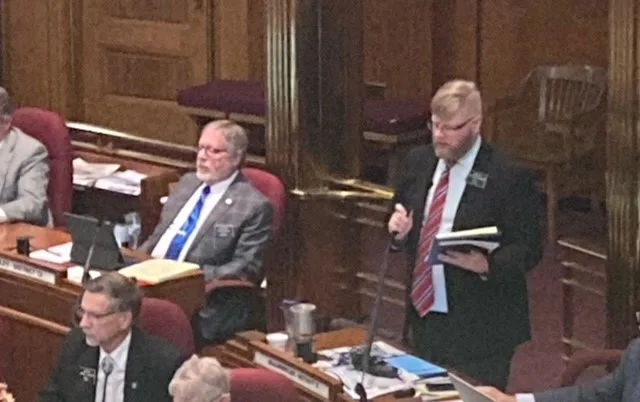

BISMARCK – Much discussion and debate was had on the House floor Friday over the definition of male and female.
House Bill 1139, which defines sex, passed the House floor with a vote of 81 to 11.
The bill carrier, Representative Brandon Prichard, R-Dis. 8, Bismarck, said the bill does a few things, including creating a simple definition of what a birth record is and defining sex as a biological state of being male or female based on non-monogamous organs, chromosomes, and hormonal profiles at birth. Later in section 2, birth records must include sex of the child as either male or female, and entry of not yet determined can be included in the rare case of a dis-formality.
Representative Jim Kasper, R-Dis. 46, Fargo, said he hopes the chamber will be in favor of a bill in the future which will not allow the sex on birth certificates to change due to a transgender situation.
“Just to clarify this one item, the birth record has nothing to do with gender,” said Representative Robin Weisz, R. Dis. 14, Hurdsfield. “It’s strictly stating the sex. Sex is not gender.”
The Senate passed Senate Bill 2041, which expands on an anti-explicit images law, by a vote of 46 to 0.
“This bill is a bill that covers the civil penalty for individuals that send explicit images against the will of others,” described Senator Ryan Braunberger, D-Dis. 10, Fargo.
The bill exempts the use in good faith in law enforcement investigations, proceeds investigations, medical education and treatment, and legal guardians of children.
The bill repeals section 32-03-58 of the North Dakota Century Code which Braunberger said is a very limited version of Senate Bill 2041.
The House also passed House Bill 1121 by 67 to 25, which increases the penalty of simple assault on anyone employed by or contracted with a healthcare facility, when the assault takes place in a hospital, clinic, or mobile setting such as an ambulance. The penalty would be increased from a Class B misdemeanor to a Class C felony.
Some opponents said the definition of simple assault is too broad, as it includes anything that causes pain and should therefore not be a felony. Some proponents of the bill said the healthcare workers, law enforcement, and state’s attorneys may use discretion.